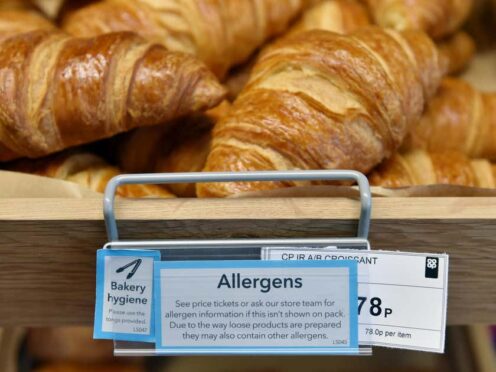
Around 6% of the UK adult population have a doctor-diagnosed food allergy, according to a study by the food safety watchdog.
More than 30% of adults also report living with symptoms of food “hypersensitivity”, meaning they have an unpleasant reaction as a result of consuming a particular food, the Food Standards Agency’s Patterns and Prevalence of Adult Food Allergy (PAFA) report said.
Food hypersensitivity includes allergies, intolerances and coeliac disease.
The FSA said around 6% of UK adults, or 2.4 million people, are estimated to have a clinically-confirmed food allergy.
Foods such as peanuts, and tree nuts like hazelnuts, walnuts and almonds, are the most likely to cause an allergic reaction, the study found.

“Many” individuals also reported allergies to fresh fruits such as apple, peach and kiwi.
Allergies to multiple foods was often associated with an allergy to tree pollen such as birch, researchers found.
However, the study found allergies to foods like milk, fish, shrimp and mussels were uncommon.
While the majority of food allergies in young adults were a continuation of a childhood allergy, 70% reported their allergies developed in adulthood.
The report said further evidence is needed to understand how environmental factors such as pollution, climate change and highly urbanised environments, and exposure to birch and related tree pollens, lead to adult-onset food allergies.
The FSA’s chief scientific adviser, Professor Robin May, said: “The PAFA report is significant in helping us identify how food allergies evolve between childhood and adulthood, as well as providing vital insights into links between certain types of foods and the persistence of allergies into adulthood.
“Through this research, we can see patterns such as the emergence of plant-based allergies affecting more people into adulthood, which is important for us to consider as we’ve seen the food system move towards plant-based diets and alternative proteins.
“The FSA remains committed to ensuring that consumers have clear and accurate allergen labelling to support people in the UK living with a food allergy.
“This report will help guide our future work on allergens to ensure everyone can enjoy food that is safe.”
Nadim Ednan-Laperouse, whose daughter Natasha died in 2016 after suffering a severe allergic reaction to sesame baked into a Pret baguette, and who is now co-founder of The Natasha Allergy Research Foundation, said: “This is a hugely significant study which confirms our view that there is a food allergy epidemic in this country.
“These new FSA figures show at least 6% of adults in the UK now have a diagnosed food allergy. This equates to a staggering 2.4 million adults living with a diagnosed food allergy in this country. These figures do not take into account children, who generally have twice the rate of food allergy compared with adults.
“With the true number of people with food allergies in this country now running into millions, it is imperative that we provide joined up NHS services and proper support for everyone with food allergies. We would urge the Government to appoint an allergy tsar to fulfil this unmet need.”

Enjoy the convenience of having The Sunday Post delivered as a digital ePaper straight to your smartphone, tablet or computer.
Subscribe for only £5.49 a month and enjoy all the benefits of the printed paper as a digital replica.
Subscribe